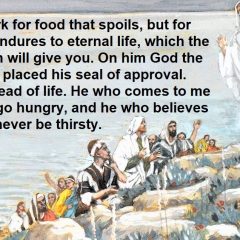bread of life
Do You Complain A Lot?

18th Sunday In Ordinary Time
Fr. Mark Gatto
Preached: August 1, 2021
Are you a complainer? Are you someone who does a lot of complaining? In our first reading from the Book of Exodus we are told that the Hebrew people were complaining. They had been liberated from an oppressive situation in Egypt and were on a journey back to their home land. Through the leadership of Moses, they were set free by the hand of God.
But, the journey was long and difficult. It was through a wilderness in which they were beginning to experience hunger. So, despite the great gift of liberation from slavery, we see them complaining to Moses and to God. Some translations say they were grumbling. Are we like the people of Israel? Despite the gift of life and the gift of salvation through Jesus, are we complaining a lot on our journey of life on the way to heaven?
I heard a story from J.D. Salinger’s book, Frannie and Zooey. In one scene Frannie comes home from college a nervous wreck. She had made a well intentioned but misguided effort to explore the depths of religious mysticism and it left her extremely tense. Her mother saw this when she got home and showed her concern and care by bringing her a cup of chicken soup. But, though she knew her mother was trying to comfort her, the offer of the chicken soup annoys her, and she lashes out at her mother.
Frannie’s brother confronts her and tells her that her approach to religion is all wrong. He says to her, “I’ll tell you one thing, Frannie. If it is religious life you want, you ought to know that you are missing out on every single religious action that’s going on in this house. You don’t have sense enough to drink when someone brings you a cup of consecrated chicken soup, which is the only kind of chicken soup that Mom ever brings to anybody.”
Does our religion make us miserable and harsh? Does our religion result in us being people who are complaining all the time, grumbling? Our faith should make us people who are grateful, who express gratitude more than complaining and grumbling. When we spend our time complaining we often fail to recognize the grace of God coming to us in the simplest ways in our life.
God fed the hunger of the people of Israel with that bread from heaven that they called Manna. God feeds our hunger with the true bread from heaven, Jesus, the bread of life. But we need to recognize Jesus the bread of life in this Eucharist, in simple bread. We also need to recognize Jesus present in the poor, who are often rough and difficult. We need to recognize Jesus present in the church, for he says that where two or three gather in his name, he is there among them. The church can often be very messy and it can be hard for us to notice Jesus in a simple parish.
When life is difficult, when we experience loss in various ways, when we experience the mess of the church, or our personal failings and disappointments, it can be difficult to notice the grace of God in our life.
Jesus comes to us as the Bread of Life. We need to do less complaining and grumbling, spend more time expressing gratitude. Then we might be able to notice the grace of God in the simple moments of everyday life. In an ordinary Mass, in our sometimes frustrating family, in our messy church and parish, even in our sometimes difficult life.
